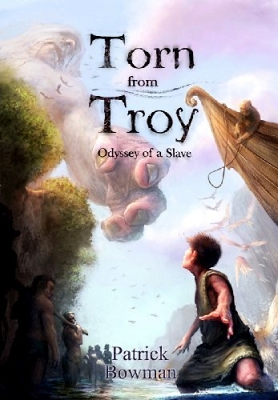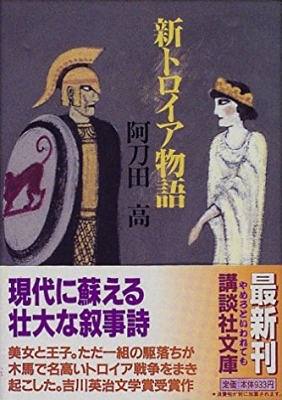 Patrick Bowman: Torn from Troy
Patrick Bowman: Torn from Troy
YA Novel
Pages: 199
First Published: 2011
My Thoughts: Torn from Troy, the first book in the Odyssey of a Slave trilogy, tells the story of Alexi, a poor Trojan orphan. When Troy falls, Alexi is taken as a slave, accompanying Odysseus and his crew through the events of the Odyssey.
The main thing that stood out to me when I read this book was Bowman’s depiction of Troy at war. Not only is this book not at all about the Trojan royal family (only Cassandra – here called “Cassie” for some reason – puts in a brief appearance), but Bowman commits to writing his protagonist as a poor boy who’s lived nearly his whole life in a city under siege. The casual tone Alexi uses to talk about the terrible things he’s witnessed makes sense for the character in a way that I was absolutely not expecting from a book I found in the children’s section, so praise for that. The bruality of Alexi’s world continues after he’s taken as a slave by Odysseus – here called “Lopex” for some reason – although apart from that, there aren’t too many surprises in the narrative.
When I finished Torn from Troy, I figured I would continue with the trilogy, and so I read the first several chapters of the second book, Cursed by the Sea God. Unfortunately, this is where the trilogy fell apart for me. I have a pretty strong dislike for stories where the characters travel from one place to another, only spending enough time to get a superficial understanding of each one-dimensional place before moving on. (Is there a name for this kind of story? Let me know because I have no idea what to call it.) The story of Odysseus’s return home does more or less fit into this category, but the Odyssey plays enough with its structure and has enough other things going on that I think it’s one of the best examples of it.
In the first few chapters of Cursed by the Sea God, however, Bowman’s Odyssey retelling becomes everything I dislike about these travel stories. The characters arrive on Aeolia, an island with a dangerous secret! Well don’t worry, because it only takes Alexi about fifteen minutes to discover the secret and solve the problem. The solution is extremely simple and one of the first things you would think to try, and yet the people of Aeolia have suffered from this problem for years. Thank goodness Alexi came along and was able to solve it with the information he spent five minutes gathering.
This kind of story can work when you’re talking about heroes in mythology, but as a section in a trilogy that until that point had made an effort to be a realistic portrayal of the life of a slave in antiquity, it was very disappointing. There was no depth or complexity to the Aeolia chapters and it took me out of the story completely. But if you’re a fan of this kind of travel story – or if you’re in this trilogy’s target demographic – you’ll probably enjoy Odyssey of a Slave more than I did.
Buy it at: Amazon.com, Amazon.ca
 Takashi Atoda: Shin Toroia Monogatari
Takashi Atoda: Shin Toroia Monogatari
Novel
Japanese Title: 新トロイア物語
Pages: 689
First Published: 1997
My Thoughts: (I admit it’s a bit weird to post about a Japanese novel on an English language blog when that novel has not been translated into English. Read on if you’d like a glimpse inside this retelling from another part of the world …)
Shin Toroia Monogatari – the title can be parsed as either The New Story of Troy or The Story of New Troy – follows Aeneas from his childhood to his death, covering both the events of the Trojan War and the quest to build a new Troy. For the longest time, the uninspired cover image, the dry lecture of an opening paragraph, and my mistaken belief that Atoda usually wrote non-fiction had me believing that this novel would be little more than a by-the-book retelling of the Trojan War myth. Now that I’ve finally gotten my Japanese to a level where I was able to read the whole thing (with a dictionary to help me here and there), I was happy to discover how wrong I was. Atoda plays with the story plenty, and for the most part this book was a really surprising, really interesting read.
There are light SPOILERS in the paragraphs below!
My favourite thing about this book, believe it or not, is its Paris. Paris is not usually one of my favourite characters, but I loved him here. His decade-long absence from Troy is made into something of a mystery – did Priam send him away as punishment for something, or did he leave because he wanted to? – so that you’re not quite sure what to make of him when he reappears. And he’s a bit of a jerk at first, flat-out telling a young Aeneas that Aphrodite has only been declared Aeneas’s mother because Aeneas’s father paid the oracle to say so. But as soon as I got to the brutally honest ramble in which he lists all his flaws and compares them to Hector’s virtues, making Aeneas promise that he’ll choose Hector if he ever has to choose between the two of them, I was sold. This Paris is just as imperfect as he usually is, but just having him be aware of it and honest about it really endeared me to him.
I also really liked this book’s version of the death of Achilles. Achilles is killed in the night, and Aeneas has every reason to believe that Paris did it as revenge for Hector’s death. But when Aeneas goes to ask Paris about it, Paris laughs it off as the work of the gods. His refusal to take credit for the best thing he ever does for his city – for the brother he knew was the better person – is excellent, I love it. New favourite Paris.
My second favourite thing about this book will come as no surprise: I really enjoyed the scene where Aeneas visits Helenus and Andromache after the war. The way their excitement at seeing each other again transitions into tension between Aeneas, who believes Helenus is duty-bound to go with him to rebuild Troy, and Helenus, who has put Troy behind him and started a new life, is fantastic. I love how Aeneas seems to think that “You’re a prince of Troy” is the only reason Helenus should need for joining Aeneas on his journey, and how he never seems to fully understand why Helenus turns him down.
Unfortunately, after Aeneas and Helenus parted ways, my enjoyment of the book slowly but steadily declined, to the point where I had to force myself through the last hundred pages. I think the main reason for this is that Atoda’s Aeneas is a pretty empty character. He is “pious Aeneas” but not much else. During the first half of the book, where he acts as our viewpoint character for the events in Troy, he reacts so little to what happens around him that I often forgot he was there. On top of that, it really feels like all of the potentially interesting challenges Aeneas encounters are quickly wrapped up with an “Ah well, I’m sure I did the right thing.” As the story goes on and the more interesting characters are left behind, we enter Atoda’s version of the Latium conflict, where all of the new characters are either completely good or completely evil. It doesn’t help that everyone in this section speaks in such overly polite language that the scene in which Aeneas confesses his love to Lavinia felt to me like some kind of parody. I’ve read a few Japanese reviews of this book and none of them have mentioned this section at all, so it may very well be that it didn’t work for me because I’m not a member of the culture that it was written for – in the author’s note, Atoda does admit that he feels his Aeneas is a modern Japanese man dropped into the ancient world – but I found it pretty tough to get through. (Not that that stopped me from tearing up a little when the last pages of the book started echoing the first pages of the book …)
Although the last hundred pages did diminish my enthusiasm for Shin Toroia Monogatari, overall I did really enjoy it and all the surprises it offered. So far it’s the only Japanese retelling of the Trojan War I’ve found that allows its author some creative license. I’ll keep my eye out for another.
Buy it at: Amazon.co.jp, BookLive (where you can also preview the first fourteen pages in your browser)
Leave a comment